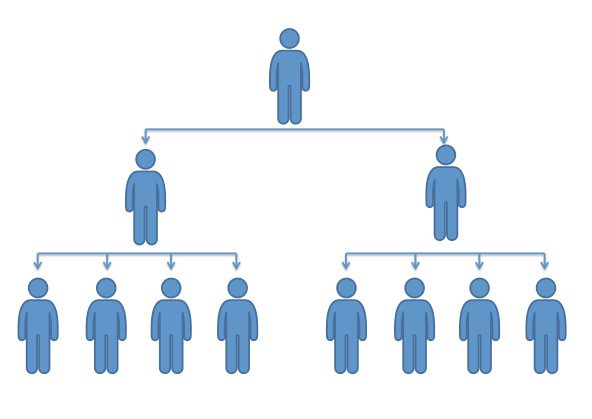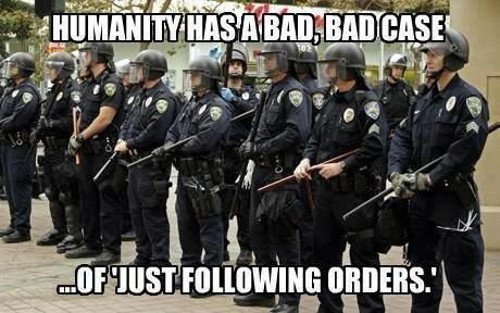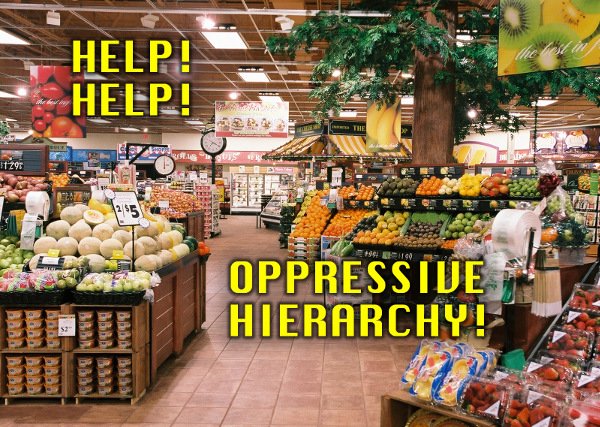Hierarchy: Good or Bad? (Part 4 of a Series)

Sometimes “painting with a broad brush” can transform a rational idea into something downright silly. It seems that some people like very general scapegoats to blame things on. To some people, all of the problems in the world are the fault of greed, or money, or inequality, or guns, or hate, etc. This article will deal with “hierarchy,” which is a favorite scapegoat of some on the political left, including some leftists who wear the label “anarchist.”
There are many types of arrangements that could be viewed as hierarchy, such as a military chain of command, a football team and its captain, an employer and his employees, a teacher and his students, and so on. In fact, taken in the broad sense, removing “hierarchy” from society would mean removing any situation in which one person even instructs or guides another on what to do. To be blunt, achieving such a goal is impossible, and attempting it is insane.
Imagine if in every business, organized undertaking, or group of people, no one ever followed the instructions of anyone else. Imagine a football team where every player decided for himself what play he would run, instead of subjecting himself to the “hierarchy” of the team captain or coach (or whoever calls the plays). Imagine a company that had no plan for what product it was making, no plan for who should do what, or for who is even part of the company. Organizational structure can be very strict, or very relaxed, or anything in between, but to all the way have no one deciding anything except for himself makes any complex undertaking nearly impossible.

The moment you have organization, you also have some form of hierarchy. There are, of course, certain types of hierarchy that society would be better off without. There are two ways in which a hierarchy can be inherently immoral and destructive: 1) when those at the “top” use force to compel obedience from those “below,” and; 2) when those following someone else’s instructions imagine themselves to bear no responsibility for their own actions. In other words, when hierarchy involves “authority”—where the commanders think they have the right to command and the obeyers think they have the obligation to obey—then it is horrendously dangerous. But the problem there is the belief in “authority,” not the presence of hierarchy.
Often even voluntary hierarchical arrangements are described using authoritarian terminology. For example, an employer might be referred to as a “boss.” However, the only power the employer really has is the same power the “worker” has: the power to terminate the arrangement. When an employer wants to stop paying someone for their labor, it’s called “firing” that person. When the worker wants to end the deal, it’s called that person “quitting.” But both have equal power, and neither can coerce the other into doing anything. Any employer who attempted to forcibly conscript workers would be universally recognized as being in the wrong.
Furthermore, any employee who followed instructions to commit fraud, theft, assault or murder, and who then argued, “Hey, I was just doing as I was told,” would also be recognized as being in the wrong. This is because, without the involvement of the belief in “authority,” people don’t think that hierarchy can make something bad into something good.

There is nothing wrong with an individual who willingly follows the instructions of someone else, while still accepting personal responsibility for whatever he actually does. In fact, society could not exist without such things happening nearly constantly. The number of possible examples is staggering: a new driver follows the instructions of a driving instructor; a landscaper does the work that a property owner tells him to do; a hiker chooses to go the direction the guide says he should; an orchestra follows the lead of a conductor; an apprentice follows the guidance of his mentor; and so on, ad infinitum. To condemn “hierarchy,” in and of itself, is to condemn a huge percentage of voluntary, productive, useful and moral human behavior.
Some people even make the absurd claim that being an anarchist requires opposing all hierarchy. But “anarchism” means the advocacy of “rule by no one,” while voluntary hierarchy has nothing at all to do with ruling. Voluntarily cooperating while following someone else’s lead is not being ruled. Apparently some people’s juvenile desire to never have to follow anyone else’s requests, instructions or advice leads some to declare that any arrangement where one person tells someone else what to do (i.e., any hierarchy) must be oppressive and unjust.

This immature view is why a lot of people hallucinate oppression when it comes to “employers” and “employees.” No, an “employer” obviously doesn’t have the right to force you to do what he says. However, employers do have every right to not hire you, not trade with you, and not interact with you at all. To claim that not trading with someone is the same as violent oppression is just ridiculous. If two people find a mutually agreeable arrangement where one pays the other to do certain work, there is nothing immoral or oppressive about that, even though it could be viewed as a “hierarchy” of sorts.
To lump voluntary and forced “hierarchy” together, and then condemn both, makes as much sense as talking as if all trade is theft, or all physical contact is assault. The problem is that the entitlement-mentality leftists don’t seem to understand the rather huge difference between these two sentiments:
“I should be able to do whatever I want, whenever I want to, and not ever have to do what anyone else wants me to, and still get whatever stuff I need for free.”
“No one should force me to do anything, but often it’s helpful to voluntarily cooperate and trade with others for mutual benefit.”
Thinking the former makes you a communist. Thinking the latter makes you a responsible, rational human being. The two are mutually exclusive.

Very good post @larkenrose. Enjoyed the content.
There is actually another solution, a horizontal organization as opposed to a vertical one. One prime example is an Octologue. We're building an example of one in Anarchapulco.
You can organize any way you want, but organization will always imply a structure of somekind.
Stratifications are essential to the emergence of complexity. But humans should learn to avoid exclusion and coercion on the basis of a class. Hierarchy as a means to cooperate is great. Oppression resulting from hierarchical structures is the result of an abuse of position. Great article.
It is true that humans voluntarily seek into hierarchy and that deeming all hierarchies bad are stupid. But I kind of wonder how you make the first of you two sentiments communist. It's like saying that libertarians are fascists, which you sometimes hear on the left. It's a contradiction in terms. Fascists are anti-libertarians. Everybody in a communist society are supposed to work for the state and subject to the community. Not much freedom there.
Another perversion of the hierarchy structure TPTshouldn'tB use is that every level is told a different lie.
Grunts: We have to stop communism
Enlisted: I see a promotion in your future (if we achieve these objectives)
Generals: This war is helping our economy (and the summer cottage is really nice too)
When the hierarchy is based on different lies, it is no wonder the entire structure seems to be inept and idiotic.
anarcho-capitalism has nothing to do with anarchy, its just tyrany of those who have capital over those who have no capital. id rather choose state to be the tyran